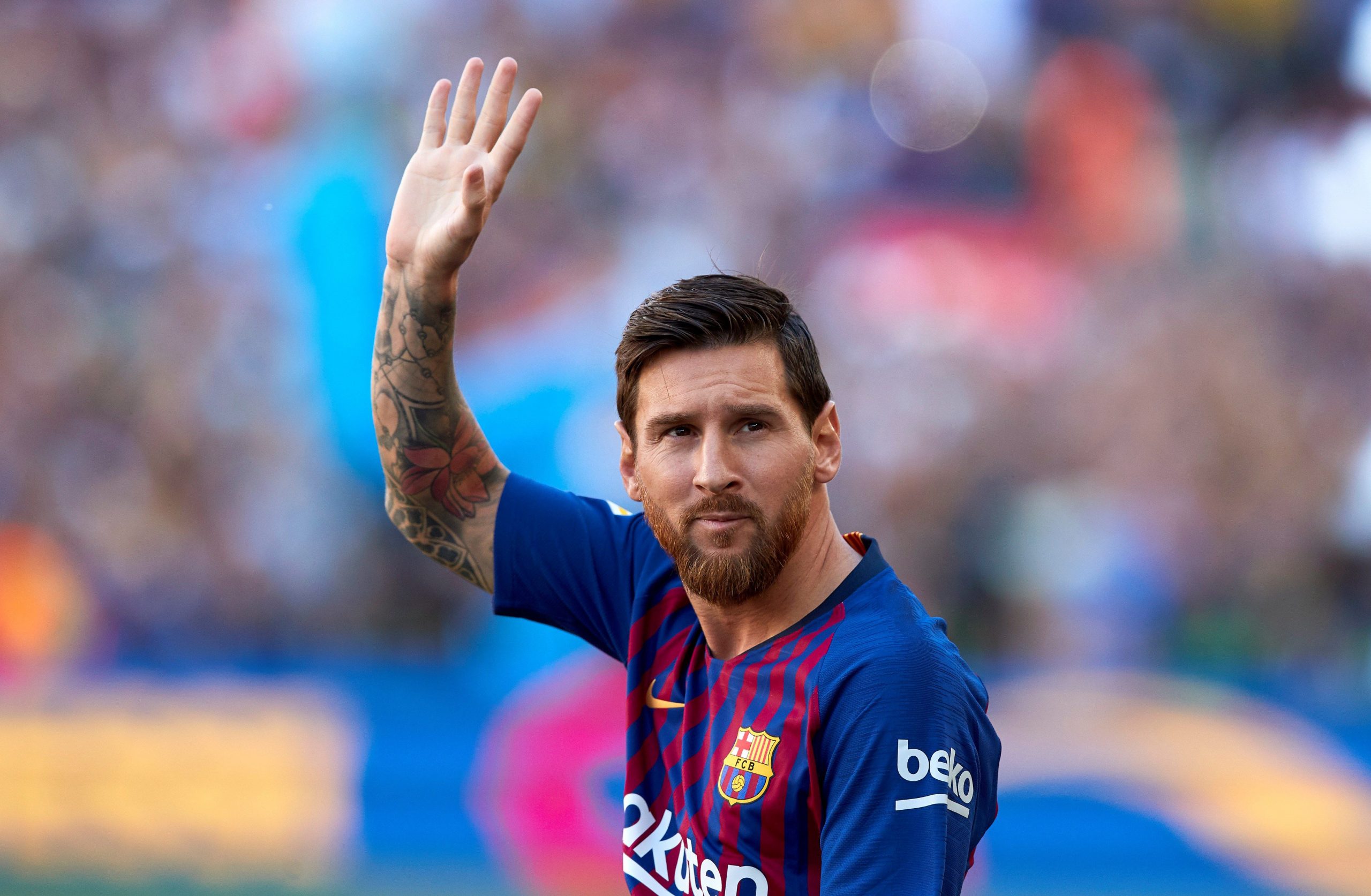By any realistic measure Barcelona had a dominant season last year. They won their domestic league by 14 points, while losing only a single game. They also won their domestic cup. But Barcelona are a club destined to fail to live up to expectations that only they can set. And what came to define their season, more than the raging success of their domestic campaign, was a stunning Champions League quarterfinal defeat to Roma. And so it is that the team which ran up 93 points in La Liga set about correcting for a failed season.
A Different Defense
Perhaps the defining tactical characteristic of Barcelona’s first season under new manager Ernesto Valverde was their somewhat more restrained defensive approach. It’s been a long time since Pep Guardiola was manning the sidelines at Barcelona, but despite the intervening years, and the four managers to have helmed the team since he left, an active counterpress had remained a huge part of the team’s success. Losing the ball had always been followed by winning it back immediately. That changed under Valverde. Their defensive actions still largely occurred in their opponents half of the field. The heatmap below shows a lot of red a long way from their own goal. 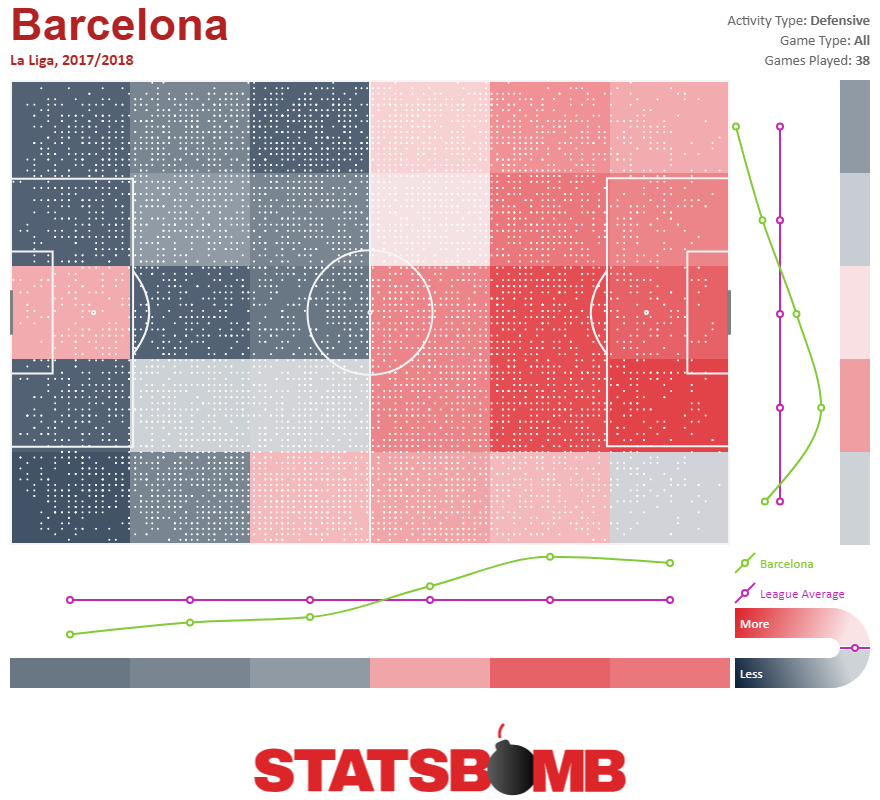 But it’s much less pronounced than the most aggressive defenses in the world. Here, for example, is what Guardiola got up to last season with Manchester City. Now, that’s a press! It's an absolutely unbreakable wall of red around the opposing team's goal.
But it’s much less pronounced than the most aggressive defenses in the world. Here, for example, is what Guardiola got up to last season with Manchester City. Now, that’s a press! It's an absolutely unbreakable wall of red around the opposing team's goal. 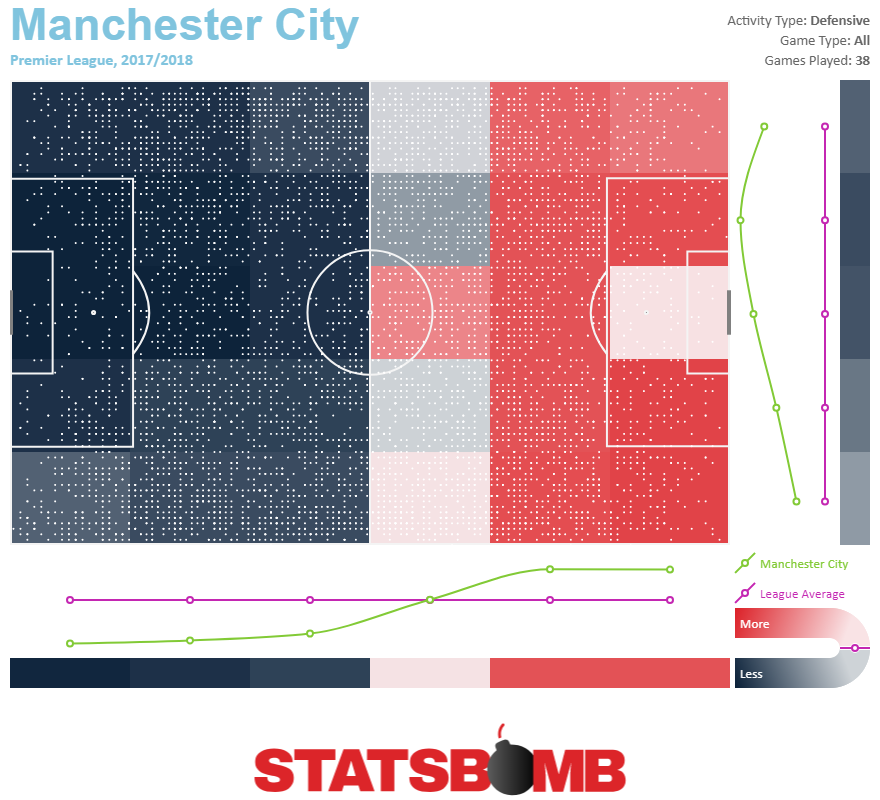 The other defensive factor that becomes apparent when looking at the heat map is how lopsided the side was. Barcelona seemed to be better and more aggressive pressuring the ball on the right side of the field than the left. There were a couple of reasons for that. The first is a personnel thing. Not infrequently Paulinho would be playing on the right. Valverde’s system was a little strange and lopsided and would often result in both Paulinho and Ivan Rakitic playing on the same side. Nominally one of them would be a winger while the other would be partnerning Sergio Busquets in midfield. Although Busquets would also, at least in possession, continue to function mostly as a single pivot. Regardless the result was a bunch of players good at being aggressive defensively on the right side of the pitch. On the left side…we need to talk about Andres Iniesta. There’s a reason last year was his final one at the top levels of the game. Iniesta has long been a difficult player to categorize, one who excels at the quieter things, and was understated at the louder things. And he still did a lot of good work in possession for Barcelona last season. But, defensively, his age showed. His declining mobility meant he simply wasn’t able to pressure the ball as frequently or effectively as he had been earlier in his career. And he noticeably dropped behind his fellow midfielders when it came to pressing the ball.
The other defensive factor that becomes apparent when looking at the heat map is how lopsided the side was. Barcelona seemed to be better and more aggressive pressuring the ball on the right side of the field than the left. There were a couple of reasons for that. The first is a personnel thing. Not infrequently Paulinho would be playing on the right. Valverde’s system was a little strange and lopsided and would often result in both Paulinho and Ivan Rakitic playing on the same side. Nominally one of them would be a winger while the other would be partnerning Sergio Busquets in midfield. Although Busquets would also, at least in possession, continue to function mostly as a single pivot. Regardless the result was a bunch of players good at being aggressive defensively on the right side of the pitch. On the left side…we need to talk about Andres Iniesta. There’s a reason last year was his final one at the top levels of the game. Iniesta has long been a difficult player to categorize, one who excels at the quieter things, and was understated at the louder things. And he still did a lot of good work in possession for Barcelona last season. But, defensively, his age showed. His declining mobility meant he simply wasn’t able to pressure the ball as frequently or effectively as he had been earlier in his career. And he noticeably dropped behind his fellow midfielders when it came to pressing the ball. 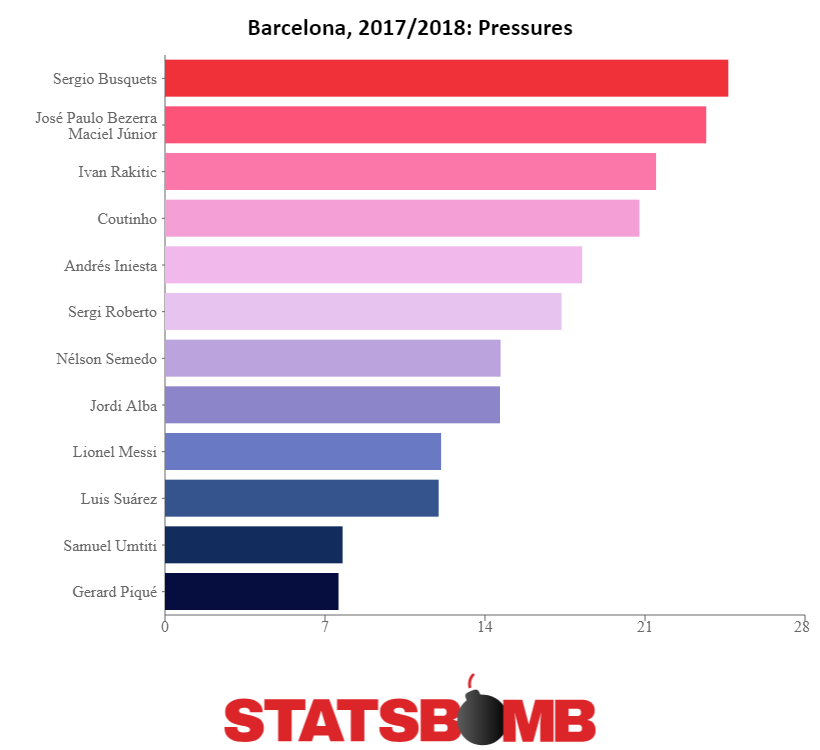 Iniesta will obviously be missed, but this season his absence will likely upgrade the team’s defensive solidity. On top of that, Barcelona acquired Arturo Vidal from Bayern Munich, and shipped Paulinho back from whence he came. Pauliho proved a useful, if limited, player, both adding defensive stability and goals to the side, but Vidal does all the things that Paulinho was good at but better, and he also does all the things that Paulinho was bad at at a world class level. At 31 years old Vidal probably doesn’t have that many great years left, but right now he remains one of the best all around midfielders in the game. Expect Barcelona’s defense to be better this year than last.
Iniesta will obviously be missed, but this season his absence will likely upgrade the team’s defensive solidity. On top of that, Barcelona acquired Arturo Vidal from Bayern Munich, and shipped Paulinho back from whence he came. Pauliho proved a useful, if limited, player, both adding defensive stability and goals to the side, but Vidal does all the things that Paulinho was good at but better, and he also does all the things that Paulinho was bad at at a world class level. At 31 years old Vidal probably doesn’t have that many great years left, but right now he remains one of the best all around midfielders in the game. Expect Barcelona’s defense to be better this year than last.
Messi Facilitates the Attack
Lionel Messi. You might have heard of him. He’s pretty good and stuff. He’s 31 now, and evolving into what will likely be his final form. Last season he became an extraordinary facilitator, who just happens to score a ton of goals. 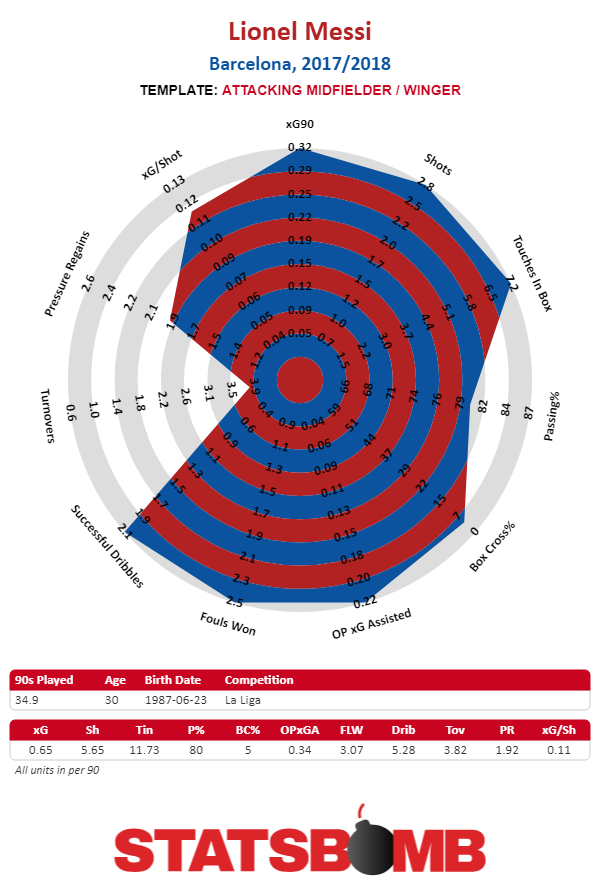 When Barcelona were running out a front three of Neymar, Messi and Luis Suarez, the creative duties were largely split between the two wingers with whoever didn’t have the ball at their feet joining Suarez to torture opposing back lines. With Neymar gone, Messi just did all of the creative work. He led the team in assists (among players who played at least 1000 minutes) with 0.37 per 90 minutes which was right in line with his expected goals assisted of 0.38. He was also second on the team in deep progressions per 90, that is, bringing the ball into the final third either by passing or carrying it, with 10.37 (Iniesta was first at 12.87). Often times, Messi and Suarez were listed as a pair of strikers, but obviously their roles differed dramatically. Suarez led the line and Messi dropped into midfield to get the ball. Accordingly Suarez had just under 19 touches in the penalty area per game and Messi had just under 12 (although that was still second highest on the team). Oh, and in addition to all that passing, Messi just managed a casual 32 non-penalty league goals. One potential concern here is that given his duties as a facilitator, Messi’s goals came from a weaker selection of shots than he’s historically taken. His expected goal tally was only 22.61, and even perhaps the greatest player of all time isn’t entirely immune from the laws of finishing gravity. This year it seems likely that either his goal scoring will end up declining somewhat or the system will end up being tweaked to relieve him of some ball progression duties in order to let him get in better positions to score.
When Barcelona were running out a front three of Neymar, Messi and Luis Suarez, the creative duties were largely split between the two wingers with whoever didn’t have the ball at their feet joining Suarez to torture opposing back lines. With Neymar gone, Messi just did all of the creative work. He led the team in assists (among players who played at least 1000 minutes) with 0.37 per 90 minutes which was right in line with his expected goals assisted of 0.38. He was also second on the team in deep progressions per 90, that is, bringing the ball into the final third either by passing or carrying it, with 10.37 (Iniesta was first at 12.87). Often times, Messi and Suarez were listed as a pair of strikers, but obviously their roles differed dramatically. Suarez led the line and Messi dropped into midfield to get the ball. Accordingly Suarez had just under 19 touches in the penalty area per game and Messi had just under 12 (although that was still second highest on the team). Oh, and in addition to all that passing, Messi just managed a casual 32 non-penalty league goals. One potential concern here is that given his duties as a facilitator, Messi’s goals came from a weaker selection of shots than he’s historically taken. His expected goal tally was only 22.61, and even perhaps the greatest player of all time isn’t entirely immune from the laws of finishing gravity. This year it seems likely that either his goal scoring will end up declining somewhat or the system will end up being tweaked to relieve him of some ball progression duties in order to let him get in better positions to score. 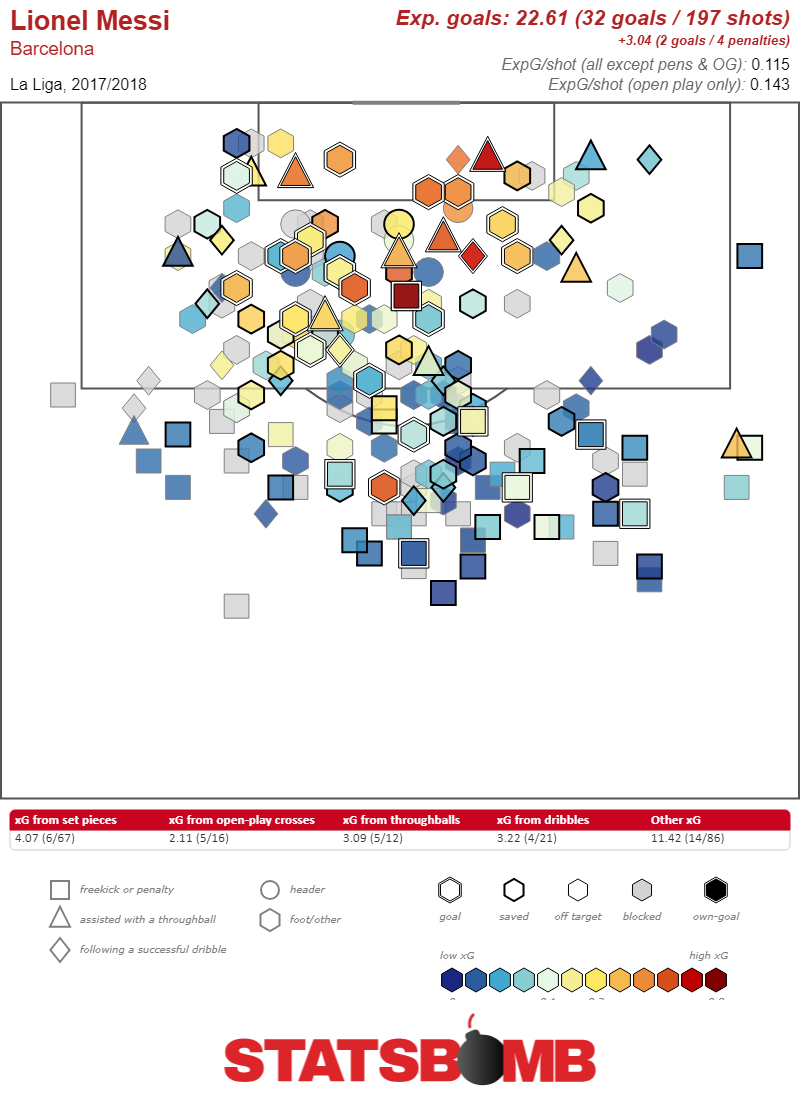 The main beneficiary of Messi’s passing was Suarez. Suarez had an interesting season. He scored 24 non-penalty goals from an expected goal total of 22.1. That’s a really good return, and a mild overperformance of his xG. And yet, he, like so many strikers before him, felt worse. It seemed like he missed buckets of good chances, wasting the genius passing of Messi that set him free time and again. And to a certain point, that’s true. He missed a lot of good chances.
The main beneficiary of Messi’s passing was Suarez. Suarez had an interesting season. He scored 24 non-penalty goals from an expected goal total of 22.1. That’s a really good return, and a mild overperformance of his xG. And yet, he, like so many strikers before him, felt worse. It seemed like he missed buckets of good chances, wasting the genius passing of Messi that set him free time and again. And to a certain point, that’s true. He missed a lot of good chances. 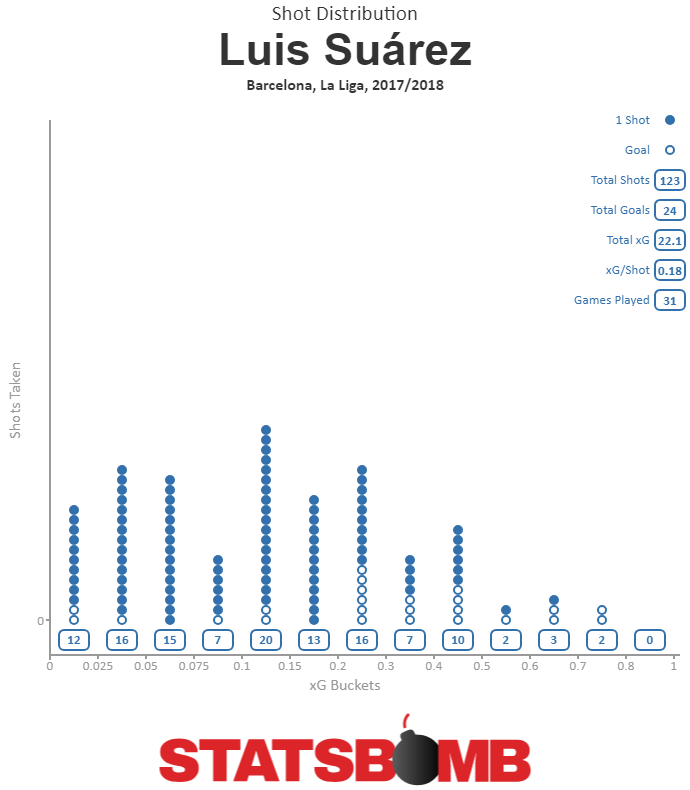 He missed 22 shots with an xG of over 0.2. That’s enough to stick in your brain. It’s also what happens when a player has an extremely high xg/shot. Because Suarez had lots of great looks at goal he both scored as many goals as we’d expect and missed more great chances than most players in the world will (because he had more great chances than most players in the world will). Despite Suarez and Messi having the scoring seasons they did, Barcelona’s attack remained limited. In large part because their third most prolific scorer last year, both in total goals and in expected goals was Paulinho, which is….not great. And the xG gaps were large, both from the two goal scorers to Paulinho, and from the midfielder to everybody else.
He missed 22 shots with an xG of over 0.2. That’s enough to stick in your brain. It’s also what happens when a player has an extremely high xg/shot. Because Suarez had lots of great looks at goal he both scored as many goals as we’d expect and missed more great chances than most players in the world will (because he had more great chances than most players in the world will). Despite Suarez and Messi having the scoring seasons they did, Barcelona’s attack remained limited. In large part because their third most prolific scorer last year, both in total goals and in expected goals was Paulinho, which is….not great. And the xG gaps were large, both from the two goal scorers to Paulinho, and from the midfielder to everybody else. 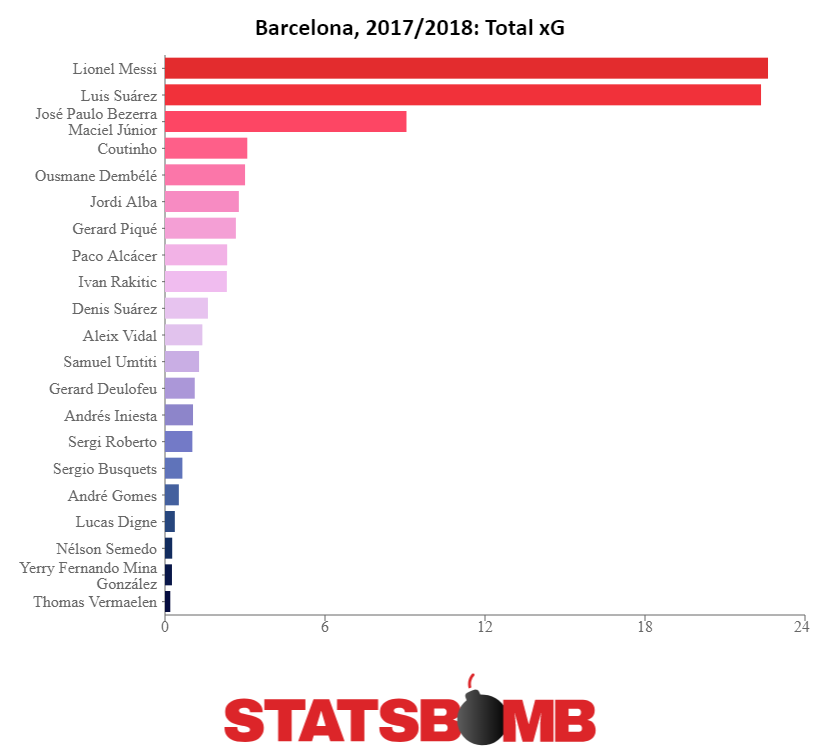 This year things should be better. For starters, there’s Vidal who we already talked about. Then there’s Philippe Coutinho who arrived last January and after half a season of bouncing around the formation should finally get to settle into his role as Iniesta heir apparent. Ousmane Dembele, who never really got off the ground last season, thanks to chronic hamstring problems, should bounce back. He’s only 21 years old, he’s got buckets of talent and is as unstoppable as it gets with the ball at his feet. If the rest of his game can catch up a little, he absolutely provides the kind of creative thrust that Barcelona missed last season. And finally, Malcom arrived from Bordeaux and he provides another young, dynamic wide scoring option. He’s a little bit wild, and his shot selection leaves a lot do be desired, but the talent is undeniable.
This year things should be better. For starters, there’s Vidal who we already talked about. Then there’s Philippe Coutinho who arrived last January and after half a season of bouncing around the formation should finally get to settle into his role as Iniesta heir apparent. Ousmane Dembele, who never really got off the ground last season, thanks to chronic hamstring problems, should bounce back. He’s only 21 years old, he’s got buckets of talent and is as unstoppable as it gets with the ball at his feet. If the rest of his game can catch up a little, he absolutely provides the kind of creative thrust that Barcelona missed last season. And finally, Malcom arrived from Bordeaux and he provides another young, dynamic wide scoring option. He’s a little bit wild, and his shot selection leaves a lot do be desired, but the talent is undeniable. 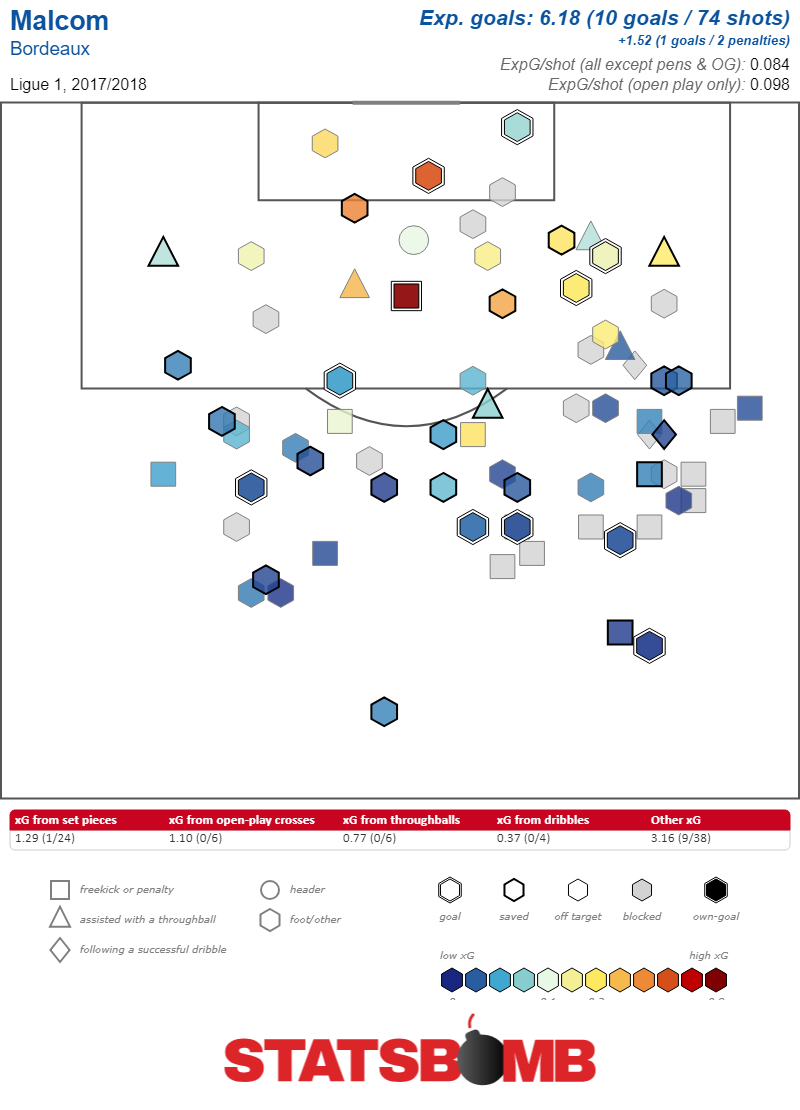
Focused on the Now
There are a lot of reasons to be concerned about Barcelona’s future. The core of their team is all over 30 with Messi, Suarez, Rakitic, Pique, Busquets, and now Vidal all being closer to the down side of their careers than their peaks. Their most exciting younger player, Dembele still needs to develop, the same goes for Malcom. They might not. Really only Coutinho, centerback Samuel Umtiti, and fullback Jordi Alba are in their prime years (and that's being generous to Alba at 29). Father time is licking his chops waiting to get a hold of this side. But, right now, Barcelona look like they could be great. They’ve upgraded where they need to upgrade, added attacking options to a squad in desperate need of them, and are improving from what was already an extremely strong foundation. Take into account that Cristiano Ronaldo is now plying his trade in Italy, and not at Real Madrid and you’ve got a Barcelona that will be an overwhelming favorite to win domestically. Then again, for Barcelona, winning the league isn’t success, it’s the bare minimum they’ll accept. Header image courtesy of the Press Association
